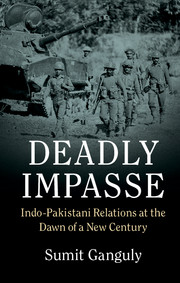Book contents
- Frontmatter
- Dedication
- Contents
- List of maps
- Preface and acknowledgments
- List of abbreviations
- 1 The rivalry revisited
- 2 Kargil and after
- 3 The troubled decade in Kashmir
- 4 The road to Operation Parakram
- 5 The composite dialogue and beyond
- 6 An extension of the rivalry
- 7 Policy implications
- In lieu of an epilogue
- Appendices
- References
- Index
7 - Policy implications
Published online by Cambridge University Press: 05 March 2016
- Frontmatter
- Dedication
- Contents
- List of maps
- Preface and acknowledgments
- List of abbreviations
- 1 The rivalry revisited
- 2 Kargil and after
- 3 The troubled decade in Kashmir
- 4 The road to Operation Parakram
- 5 The composite dialogue and beyond
- 6 An extension of the rivalry
- 7 Policy implications
- In lieu of an epilogue
- Appendices
- References
- Index
Summary
POLICY IMPLICATIONS
What are the policy implications that follow from this analysis? Obviously, various peaceful means to arrive at an accommodation have all failed to bring about any resolution of the dispute. As argued at the outset, the initial, multilateral phase, quickly became embroiled in the politics of the Cold War. Apart from arranging a ceasefire and calling for a plebiscite that was never implemented thanks to the intransigence of both parties, it accomplished little or nothing.
Indeed by the early 1960s they had ended in an impasse. Subsequently, the bilateral negotiations in 1962–3 that took place, under considerable Anglo-American pressure, also failed to produce a breakthrough. Subsequently, following Pakistan's decisive defeat in the 1971 war, even the Shimla Accord reached in 1972 failed to result in a final settlement of the Kashmir dispute and to produce a normalized relationship. Even today, Indian and Pakistani interlocutors have markedly different interpretations of the significance of the agreement. Finally, the composite dialogue of 2003–8 did not result in even the beginnings of a settlement, despite having yielded some possible guidelines for the resolution of the dispute. Though a variety of tactics and approaches have been used, none of them have brought the two parties much closer to the resolution of this intractable conflict.
Given this rather pessimistic set of conclusions what general propositions and specific policy recommendations, if any, flow from the analysis? It is evident that India does not seek to pursue a policy of territorial aggrandizement as far as Pakistan is concerned. Indeed, apart from its pre-emptive action on the Siachen Glacier, it has chosen not to expand its reach in the state of Jammu and Kashmir. Instead, it has behaved as a status quo power. Pakistan, on the other hand, has not been content to let the territorial arrangements in the state rest despite its multiple failures to alter the established order. For all practical purposes, as this analysis has sought to demonstrate, the Pakistani state, however, is not a unitary actor. The security establishment within the state continues to define, shape and implement what it deems to be the country's national security interests. To that end, altering the status quo in Kashmir, and later establishing a firm foothold in Afghanistan, have been its twin objectives.
- Type
- Chapter
- Information
- Deadly ImpasseIndo-Pakistani Relations at the Dawn of a New Century, pp. 120 - 128Publisher: Cambridge University PressPrint publication year: 2016

